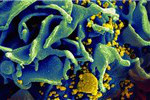 FLICKR, JJACKOWSKIIn a push for more active reader engagement after new studies are published, the newly launched PubMed Commons invites National Institutes of Health and Wellcome Trust grantees and their colleagues to begin commenting on papers indexed by the National Center for Biotechnology Information (NCBI) research database.
FLICKR, JJACKOWSKIIn a push for more active reader engagement after new studies are published, the newly launched PubMed Commons invites National Institutes of Health and Wellcome Trust grantees and their colleagues to begin commenting on papers indexed by the National Center for Biotechnology Information (NCBI) research database.
An organized post-publication peer review system could help “clarify experiments, suggest avenues for follow-up work and even catch errors,” Stanford University’s Rob Tibshirani, one of a team of scientists behind the development of PubMed Commons, told The Scientist. If used by a critical mass of scientists, he added, “it could strengthen the scientific process.”
The Commons was launched on Tuesday (October 22), and on Wednesday, NCBI presented step-by-step instructions on how join the resource to comment on PubMed articles. The agency is soliciting user comments during its pilot phase in order to improve the system before deciding whether to open it up to more scientists.
 FLICKR, NIAIDKnowing the size of the latent reservoir (LR)—the amount of dormant DNA able to make functional virus—is essential for designing anti-HIV therapies. According to the results of PCR-based tests published in Cell this week (October 24), the HIV LR persisting in CD4+ T cells is potentially 60 times larger than previously believed.
FLICKR, NIAIDKnowing the size of the latent reservoir (LR)—the amount of dormant DNA able to make functional virus—is essential for designing anti-HIV therapies. According to the results of PCR-based tests published in Cell this week (October 24), the HIV LR persisting in CD4+ T cells is potentially 60 times larger than previously believed.















